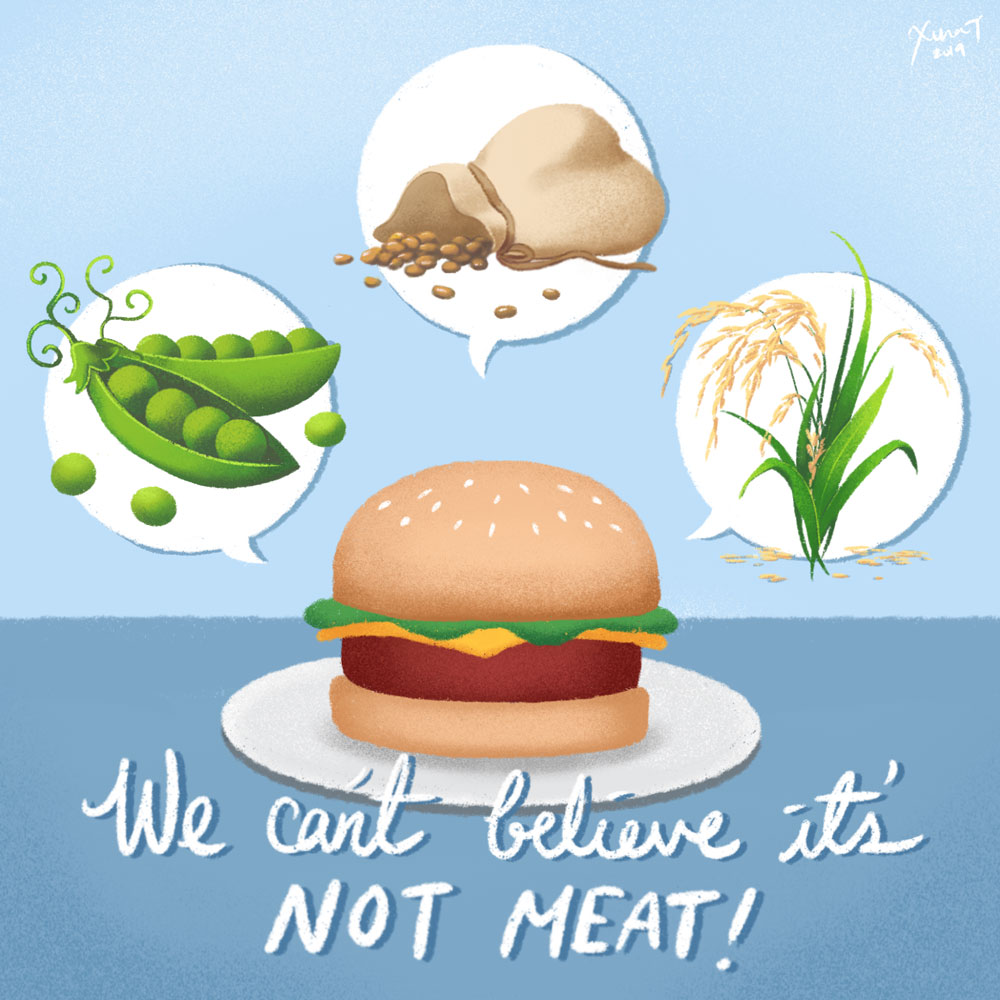
Written by Iyeh Mohammadi
Illustrated by Christina Trinh
For years, fast food chains have hailed their burgers and patties as 100% beef, often tacking on an ‘organic’ label for more flavour. More recently, however, many chains have been proudly selling 100% meatless burgers. What has changed?
Eating meat might be a personal choice, but the effects of the meat industry on the environment are undeniable. To produce enough meat to feed most of the planet, this industry needs livestock which in turn need food to eat—a lot of food. Over 80% of the world’s total farmland is used to feed livestock and this accounts for 60% of all greenhouse gas emissions from agriculture. And that’s not all; scientists estimate 86% of all land mammals are humans and livestock, contributing to what is being called the sixth mass extinction event on Earth! With growing awareness of the current climate crisis, it’s no surprise that people are embracing new plant-based meat alternatives with the promise of a much smaller environmental impact.
But we’ve already had veggie burgers for years, what makes these new meatless burgers different? The main thing that separates them is the taste. Companies leading the charge like Impossible Foods and Beyond Burgers are trying to imitate the taste and texture of meat while keeping it meat-free using plant soy proteins, wheat gluten and other plant-based materials. The Impossible Foods burger even bleeds like regular meat because of heme, a protein that gives meat its distinctive red colour but unlike regular burgers, the heme they use comes from yeast.
Of course, these meat alternatives don’t come without detractors. CEOs of major food companies like Whole Foods and Chipotle have called them out for being unhealthy and overly processed junk foods while other people have actively decried them for being fake and hazardous due to their long list of ingredients. How these substitutes actually taste depends on you and your taste buds, but in terms of unhealthiness, scientists have determined these alternatives aren’t worse than the meats they replace. And really, if you broke down the proteins and fibres in actual meat, its ingredients list would be just as long.
What’s better is that these plant-based meats aren’t the only substitutes that might be available. Researchers at Harvard are working on what could be a sustainable and ethical alternative to large-scale meat production in factories. Using the principles of regenerative medicine, they’ve successfully grown rabbit and cow muscle cells on an edible scaffold made from gelatin nanotubes spun into thin fibres; this scaffold becomes a base for growing muscle cells and together, they can imitate real muscle tissue which contributes to the texture of the meat. But this lab-grown substitute isn’t quite ready for the market yet. Researchers are still finding ways to mature lab-grown muscles like real muscles, but they know it’ll be possible in the future.
As we voice more concerns over the current climate crisis, these meat alternatives get pushed into the mainstream and are becoming more and more popular by day. Their sustainability may be impressive, but the real question is whether they can truly replace meat in our diets and the only way to be sure is to bite the burger and have a taste.
Sources:
- https://www.vox.com/2019/5/28/18626859/meatless-meat-explained-vegan-impossible-burger
- https://www.theguardian.com/environment/2017/oct/05/vast-animal-feed-crops-meat-needs-destroying-planet
- https://www.theguardian.com/environment/2018/may/31/avoiding-meat-and-dairy-is-single-biggest-way-to-reduce-your-impact-on-earth
- https://www.thejustice.org/article/2016/09/impossible-food
- https://en.wikipedia.org/wiki/Hemeprotein
- https://www.vox.com/future-perfect/2019/10/7/20880318/meatless-meat-mainstream-backlash-impossible-burger
- https://news.harvard.edu/gazette/story/2019/10/lab-grown-meat-gains-muscle-as-it-moves-from-petri-dish-to